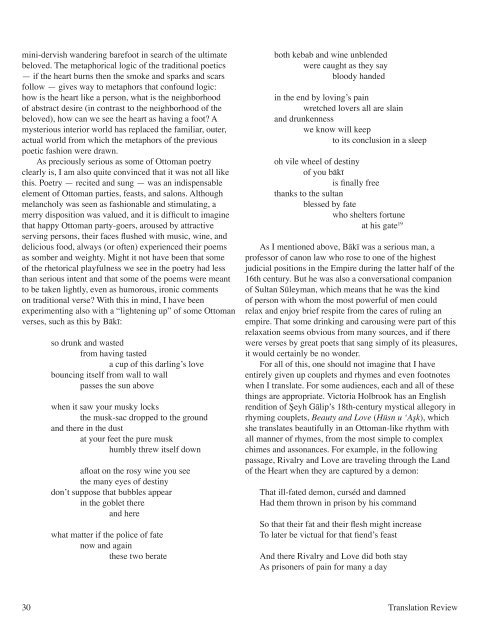Translation Review - The University of Texas at Dallas
Translation Review - The University of Texas at Dallas
Translation Review - The University of Texas at Dallas
Create successful ePaper yourself
Turn your PDF publications into a flip-book with our unique Google optimized e-Paper software.
mini-dervish wandering barefoot in search <strong>of</strong> the ultim<strong>at</strong>e<br />
beloved. <strong>The</strong> metaphorical logic <strong>of</strong> the traditional poetics<br />
— if the heart burns then the smoke and sparks and scars<br />
follow — gives way to metaphors th<strong>at</strong> confound logic:<br />
how is the heart like a person, wh<strong>at</strong> is the neighborhood<br />
<strong>of</strong> abstract desire (in contrast to the neighborhood <strong>of</strong> the<br />
beloved), how can we see the heart as having a foot? A<br />
mysterious interior world has replaced the familiar, outer,<br />
actual world from which the metaphors <strong>of</strong> the previous<br />
poetic fashion were drawn.<br />
As preciously serious as some <strong>of</strong> Ottoman poetry<br />
clearly is, I am also quite convinced th<strong>at</strong> it was not all like<br />
this. Poetry — recited and sung — was an indispensable<br />
element <strong>of</strong> Ottoman parties, feasts, and salons. Although<br />
melancholy was seen as fashionable and stimul<strong>at</strong>ing, a<br />
merry disposition was valued, and it is diffi cult to imagine<br />
th<strong>at</strong> happy Ottoman party-goers, aroused by <strong>at</strong>tractive<br />
serving persons, their faces fl ushed with music, wine, and<br />
delicious food, always (or <strong>of</strong>ten) experienced their poems<br />
as somber and weighty. Might it not have been th<strong>at</strong> some<br />
<strong>of</strong> the rhetorical playfulness we see in the poetry had less<br />
than serious intent and th<strong>at</strong> some <strong>of</strong> the poems were meant<br />
to be taken lightly, even as humorous, ironic comments<br />
on traditional verse? With this in mind, I have been<br />
experimenting also with a “lightening up” <strong>of</strong> some Ottoman<br />
verses, such as this by Bākī:<br />
so drunk and wasted<br />
from having tasted<br />
a cup <strong>of</strong> this darlingʼs love<br />
bouncing itself from wall to wall<br />
passes the sun above<br />
when it saw your musky locks<br />
the musk-sac dropped to the ground<br />
and there in the dust<br />
<strong>at</strong> your feet the pure musk<br />
humbly threw itself down<br />
afl o<strong>at</strong> on the rosy wine you see<br />
the many eyes <strong>of</strong> destiny<br />
donʼt suppose th<strong>at</strong> bubbles appear<br />
in the goblet there<br />
and here<br />
wh<strong>at</strong> m<strong>at</strong>ter if the police <strong>of</strong> f<strong>at</strong>e<br />
now and again<br />
these two ber<strong>at</strong>e<br />
both kebab and wine unblended<br />
were caught as they say<br />
bloody handed<br />
in the end by lovingʼs pain<br />
wretched lovers all are slain<br />
and drunkenness<br />
we know will keep<br />
to its conclusion in a sleep<br />
oh vile wheel <strong>of</strong> destiny<br />
<strong>of</strong> you bākī<br />
is fi nally free<br />
thanks to the sultan<br />
blessed by f<strong>at</strong>e<br />
who shelters fortune<br />
<strong>at</strong> his g<strong>at</strong>e 19<br />
As I mentioned above, Bākī was a serious man, a<br />
pr<strong>of</strong>essor <strong>of</strong> canon law who rose to one <strong>of</strong> the highest<br />
judicial positions in the Empire during the l<strong>at</strong>ter half <strong>of</strong> the<br />
16th century. But he was also a convers<strong>at</strong>ional companion<br />
<strong>of</strong> Sultan Süleyman, which means th<strong>at</strong> he was the kind<br />
<strong>of</strong> person with whom the most powerful <strong>of</strong> men could<br />
relax and enjoy brief respite from the cares <strong>of</strong> ruling an<br />
empire. Th<strong>at</strong> some drinking and carousing were part <strong>of</strong> this<br />
relax<strong>at</strong>ion seems obvious from many sources, and if there<br />
were verses by gre<strong>at</strong> poets th<strong>at</strong> sang simply <strong>of</strong> its pleasures,<br />
it would certainly be no wonder.<br />
For all <strong>of</strong> this, one should not imagine th<strong>at</strong> I have<br />
entirely given up couplets and rhymes and even footnotes<br />
when I transl<strong>at</strong>e. For some audiences, each and all <strong>of</strong> these<br />
things are appropri<strong>at</strong>e. Victoria Holbrook has an English<br />
rendition <strong>of</strong> Şeyh Gālipʼs 18th-century mystical allegory in<br />
rhyming couplets, Beauty and Love (Hüsn u ʻAşk), which<br />
she transl<strong>at</strong>es beautifully in an Ottoman-like rhythm with<br />
all manner <strong>of</strong> rhymes, from the most simple to complex<br />
chimes and assonances. For example, in the following<br />
passage, Rivalry and Love are traveling through the Land<br />
<strong>of</strong> the Heart when they are captured by a demon:<br />
Th<strong>at</strong> ill-f<strong>at</strong>ed demon, curséd and damned<br />
Had them thrown in prison by his command<br />
So th<strong>at</strong> their f<strong>at</strong> and their fl esh might increase<br />
To l<strong>at</strong>er be victual for th<strong>at</strong> fi endʼs feast<br />
And there Rivalry and Love did both stay<br />
As prisoners <strong>of</strong> pain for many a day<br />
30 <strong>Transl<strong>at</strong>ion</strong> <strong>Review</strong>

















